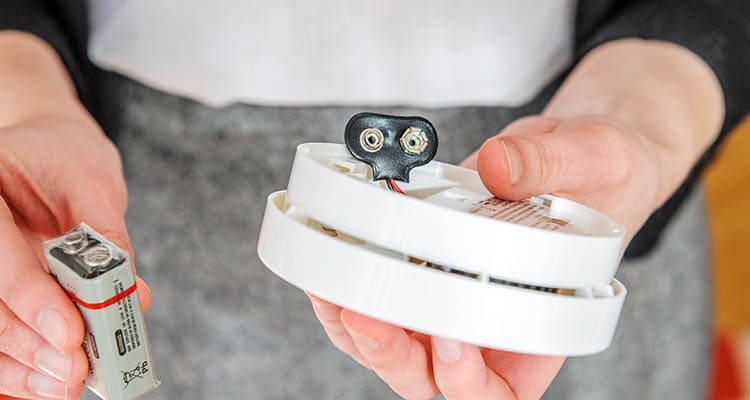Smoke detectors offer an inexpensive way to protect your home and family from fire hazards, but a false alarm from one can be headache-inducing. That annoying smoke detector beeping can be triggered randomly by dirty sensors and a number of other elements.
Here are some other common causes of false smoke alarms:
- Smoke from burnt food or cooking
- Fireplace smoke or outdoor campfires blowing indoors
- Steam and High humidity
- Low battery life
- Excess Dust or Debris
- Chemicals
- Bugs
- End of life
That pesky smoke alarm system . Almost everyone, children and adults alike, knows the sound of a smoke detector beeping-that loud wail that has been known to wake homeowners in the middle of the night. Do you ever find yourself cringing when that high-pitched siren screeches its way down from the ceiling? You're not alone.
But thankfully, there are many times when that warning sound emanates as the result of a smoke detector false alarm.
Before we get into the causes behind false alarms, it bears reminding that you should always check for a fire first. Even if you strongly believe that you have a false alarm situation on your hands, check for a fire before doing anything else. If you suspect that you have a fire for any reason, evacuate immediately and call the fire department.
Now, let's assume you are certain you have a smoke detector false alarm situation on your hands. What can you do when that fire alarm keeps going off for no reason? Luckily, most of these problems can be fixed with relative ease. Check out these false smoke alarm solutions.


Placement of the fire alarm
If you are faced with persistent false alarms, you might want to consider the placement of your smoke detectors. If they are directly positioned over an area that produces a large amount of steam or smoke, you could move them to save your ears some ringing.
These areas are ideal for smoke detectors:
- Each bedroom needs a smoke detector
- Hallways are ideal areas for smoke detectors
- Position smoke detectors near fire hazards, such as fireplaces
- Put a smoke detector near the kitchen, perhaps in an opening or hallway leading to the kitchen
- Place a smoke detector near any stairways
Now we'll identify some places where you DON'T want to place your alarm to avoid the fire alarm going off randomly.
1. Smoke from burnt food or cooking
Kitchens are frequent offenders when it comes to smoke detector false alarms. Burnt popcorn or overly cooked remnants at the bottom of toasters seem to be particularly troublesome. Keeping your smoke detector a safe distance from these items can help.
But remember, smoke alarms are meant to be sensitive so that they are effective. Their purpose is to catch a fire in your home before it becomes life-threatening. Don't position your smoke alarms so far away from these fire hazards that they have the chance to cause bigger problems.
2. Fireplace or outdoor smoke blowing indoors
If your fire alarm is installed near your fireplace or near the back patio and grill, there's a chance the smoke from these common household features could be setting off your smoke detector.
If you notice beeping every time you fire up the grill, it may be worth considering moving your device a little further away from that door or window.
Pro tip: be sure to have your chimney inspected once a year to ensure you don't have excess debris that could cause excess smoke and damage to your home's interior.
3. Steam or High Humidity
Sometimes, smoke detectors are unable to distinguish between smoke particles and heavy moisture content in the air.
If you live in an area with high humidity, there's a chance these heavy water particles are triggering your fire alarm. To prevent this, make sure to keep air moving in your home, whether that's installing a fan, turning off your humidifiers or opening a window for fresh air.
Steam can have the same effect on your alarm. Make sure you're detectors are installed far enough away from these:
- Showers
- Stovetops
- Humidifiers
If placed near a water leak, humidity might still be your culprit. Water leaks can lead to humidity that may trip an alarm.
Unfortunately, if water gets into the inner workings of your smoke detector, you will probably need a replacement.


Other Causes of a Beeping Fire Alarm
If improper placement isn't the reason for your fire alarm going off randomly, it could be due to some other common culprits.
Fire alarms are often left undisturbed on the walls of our home, inviting dust, debris and even bugs. Knowing what to look for and how to clean can help you get rid of that annoying chirp.
4. Low Battery Life
If you do not have a hardwired smoke detector. You may get a false alarm if the battery life is fading or if the detector isn't properly connected.
To check the battery, remove the outer casing and check to ensure that the old battery is properly connected. If so, it's a good idea to replace the batteries.
5. Excess Dust and Debris
Dust can reflect the light particles, similar to smoke, which gives you a false alarm.
To clean, simply remove the outer casing. Remove any large pieces of dirt or debris. Use a vacuum attachment or electronic aerosol cleaner to remove smaller particles, paying close attention to the sensors. Use care and avoid being too rough with the sensors.
6. Bugs (Yuck!)
Bugs are not pleasant, but they are fairly easy to remove from your smoke detector. The movement of tiny eight-legged intruders or the presence of dust can be just enough to trigger that cringy fire alarm sound.
Bugs love those dark corners in your home. A smoke detector might just be the place for bugs to take up residence. If bugs are an issue, you might consider using pest control sprays around your smoke alarms.
However, you will want to be careful not to spray directly on the smoke detector itself. The electronics can become damaged. Leave a careful amount of space between the smoke detector and bug spray.
7. Harsh Chemicals on the Smoke Detector
Keep in mind that harsh chemicals can also cause smoke detectors to go off. If you find this is a problem with your bug spray or cleaning products, try natural remedies.
In addition, try to keep areas vented when painting or using harsh cleaning chemicals.
8. End of Smoke Alarm Life
If you have recently replaced the batteries and checked for dust, debris and bugs and you are still experiencing a nuisance alarm, you might consider an upgrade as this may signal that it's time for a new fire alarm.
Call the experts at ADT to take the stress out of smoke detector placement. Our trained pros can help you find the best home security solutions for you and your family.
Consider a smart smoke detector
Sometimes, smoke detectors will keep going off for no reason when they have reached the end of their life span. Fire alarms have a lifespan of about 10 years, after which they will need to be replaced.
Smart smoke detectors can help eliminate some of the annoyances related to false alarms. Many come equipped with notifications that will let you know when batteries are running low. In addition, the connectivity with smartphones helps you disable false alarms more quickly. Another advantage is the ability to be integrated with other systems. For example, you can add a smoke detector that ties into your home security system, allowing you to check the status in your home and notify emergency services if an incident should occur.
Contact us to find out how we can add fire safety and carbon monoxide protection to your home security package.
Related Articles:




